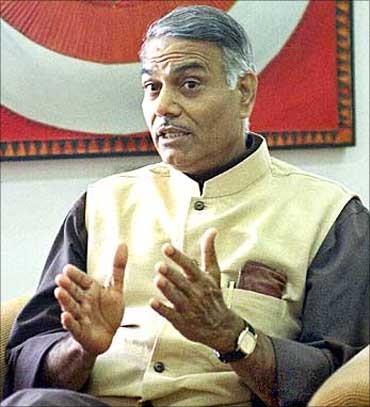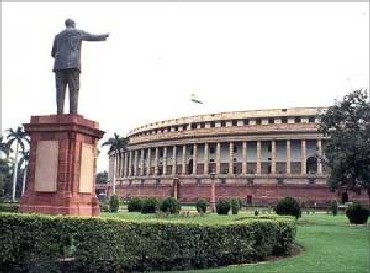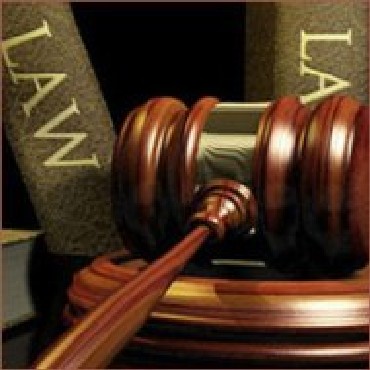 | « Back to article | Print this article |
Yashwant Sinha on DTC and Services Tax
As chairman of the parliamentary standing committee on finance, former finance minister, Yashwant Sinha, says he is committed to expediting the legislative work associated with important Bills, including the direct taxes code (DTC) and Goods and Servies Tax.
He also said work on DTC was in the final stages, and the committee was ready to give its recommendations in the winter session of Parliament.
Finance minister Pranab Mukherjee said he has talked to you to facilitate the quick passage of the financial Bills, as they were critical in tackling the current situation. Your view?
Parliament is not holding anything; therefore it is fallacious to my mind for the government to say that they will transform India into a double-digit growth economy if they get the co-operation of the Opposition, especially of the principal opposition party.
The PFRDA (Pension Fund Regulatory and Development Authority) Bill was introduced sometime in 2004, and was returned by the standing committee with commendations the next year.
From 2005 till last year, the government didn't bring it to Parliament because of the Left parties' opposition. Now, they have again introduced it. The standing committee has sent it back with recommendations.
Click NEXT to read more...
Yashwant Sinha on DTC and Services Tax
Similarly, the committee gave its recommendations on the monumental and voluminous Companies' Bill in July last year. The government has not brought it to Parliament so far. So, who is at fault? The standing committee, Parliament or the government?
It's alright if Mukherjee does talk to me from time to time. As standing committee chairman, it has been my endeavour to expedite things.
However, I want to add here that as far as principal opposition party is concerned, you can't pick and choose.
You can't say you need our help in the standing committee, but not in the public accounts committee (PAC). With a majority of one, they rejected PAC's 2G report.
Take the case of the GST. Wasn't it the government's responsibility to first work out a complete consensus with the states before introducing the GST Constitutional amendment in Parliament than leaving it to the committee. It's the government's responsibility to frame legislations and create consensus for the passage of those legislations.
Click NEXT to read more...
Yashwant Sinha on DTC and Services Tax
Standing Committee on its part is consulting states on GST. Isn't it?
We will do whatever is our responsibility. What I am saying is that despite all this, I am committed to giving my committee's reports as quickly as possible -- and that is why Mukherjee is right.
I am targeting the winter session for the DTC. I want to get rid of the Bills that are before us as quickly as possible so that we can take up other work.
The other day, we called up the RBI governor for discussing the draft guidelines for the issuance of new banking licences because we were concerned about it...some issues are there.
What I am saying is, if we get rid of these reports, then we will have more time to take up other issues that are equally important.
Click NEXT to read more...
Yashwant Sinha on DTC and Services Tax
Apprehensions have been raised that even if the committee gives its recommendations on the DTC this winter session, the government won't be able to complete the legislative work to meet the April 1, 2012 deadline for its implementation.
If we give our report in the winter session, it will be entirely open to the finance minster to include the provisions in the finance bill. If he can't, then he will have to bring another legislation. The advantage with direct taxes is that even if you pass it in the monsoon session, you can say it will effective from April 1.
On the GST, BJP-ruled states have raised some concerns. How will you tackle this?
We have the Constitutional amendment bill. While considering the Bill, we will also handle issues like taxation powers of the states and federal principles. The GST is striking at the very root of the taxation powers.
The idea, as envisaged by the founding fathers, was that the centre will tax production and the states will tax distribution. Now, we are saying both will tax both, and then the Centre will collect and give it to the states.
Naturally, the states have worries on this count. So we will have to talk to the states and find out the via media.
Click NEXT to read more...
Yashwant Sinha on DTC and Services Tax
Apart from the DTC and the GST, there are other critical financial Bills with the committee...
Yes, but not so critical: the Insurance Bill and the Banking Laws Amendment Bill. These are the two important bills.
Two Bills have been referred to us in this session: Narcotics and Benami Transactions. We have a total of seven bills. Two, we had disposed off and added two new ones.
So the number remains seven and, as I said, my idea is in cooperation with the members of the committee to dispose off these bills as quickly as possible.
The DTC is a huge piece of legislation, but we have reached a stage when I can confidently say we should be able to present it in the winter session. And maybe a couple of other bills also. We will present our report in the winter session.





